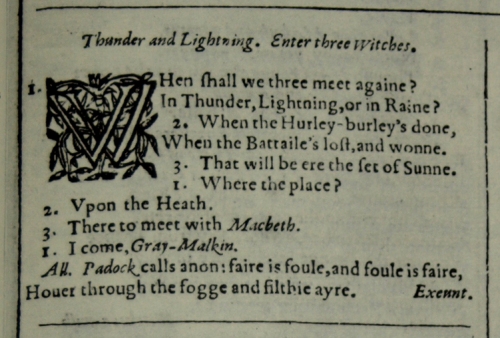What does it take to put on Macbeth with 30 fifth graders? At a bare minimum, you need a script for Macbeth, a place to rehearse & perform, some responsible adults to supervise, and 30 interested fifth graders. Let’s consider the words first.
I have always been a reader; I have a degree in English literature from a well-respected university; in My Life Before Kids I was a bookstore manager. In other words, I bleed ink. I feel well qualified to cut my own Shakespeare scripts. That is not the reason I do it myself, however: I cut my own scripts because I am a control freak. It’s not necessary to do your own editing if you are not like me—there are many abridged versions of Shakespeare plays out there. Just make sure that the text you choose has not been altered in any other way. Shakespeare’s language does not need to be dumbed-down so kids can understand it. Kids are problem-solving monkeys, and they can correctly decode lines like
Will all great Neptune’s ocean wash this blood
Clean from my hand? No; this my hand will rather
The multitudinous seas incarnadine,
Making the green one red.
with just a little guidance because they have been using context clues in reading class for years by the time they get to fifth grade.
My process for cutting Shakespeare is fairly simple: find an online version of the play, copy it into a word processing program, and start looking for Things I Will Miss the Least, bearing in mind that in the end I will need 30 reasonably-sized roles and a running time of 30-40 minutes. Shakespeare wrote a fairly taut, fast-moving Scottish play. Other than the probably non-Shakespearean addition of Hecate, and the unfortunate scene in Act IV when Malcolm tests Macduff’s integrity and they discuss the King of England’s miraculous ability to cure scrofula, there’s not a lot of fat to trim in this one. On my first pass through I cut about half the play and then put it away for a month.
After three more passes I have what I need, although it isn’t a bloodless surgery. The last pass is especially difficult; I have to cut Things I Will Definitely Miss. The main plot points are all still there, most of the great speeches remain (although all except “Tomorrow, and tomorrow, and tomorrow…” are shorter), and all the deaths are intact. Hecate, Menteith, Caithness, the Gentlewoman and Old Siward have been cut entirely. No problem there—Lady Macbeth’s sleepwalking scene isn’t less powerful when there’s no one onstage to interrupt her—but what has to go in that last cut is any pretence of nuance. I remind myself that this show is not for me. It’s for the kids, who need the exciting, gory bits more than they need to ponder Shakespeare’s use of animal imagery. What we have left is a skeletal Macbeth, about one-third the length of Shakespeare’s original text, but there is enough meat left on the bones to nourish the hungry kid bellies–with some eye of newt and toe of frog for garnish.
In order to ensure some equality in the roles, I split the role of Macbeth into four sections and the role of Lady Macbeth into three. The smaller roles will be doubled, and most everyone who is cast in a small speaking role will get to do either sword fighting or other combat. My favorite doubling is the Bloody Sergeant from Scene 2 with the Ghost of Banquo, so we won’t have to do any makeup application backstage during the performance. After I Photoshop a grisly title page, the Macbeth script is ready.

